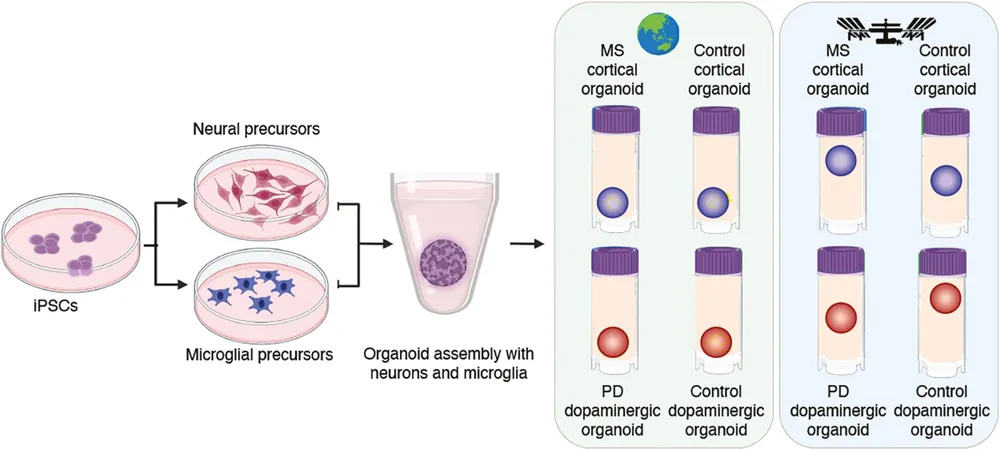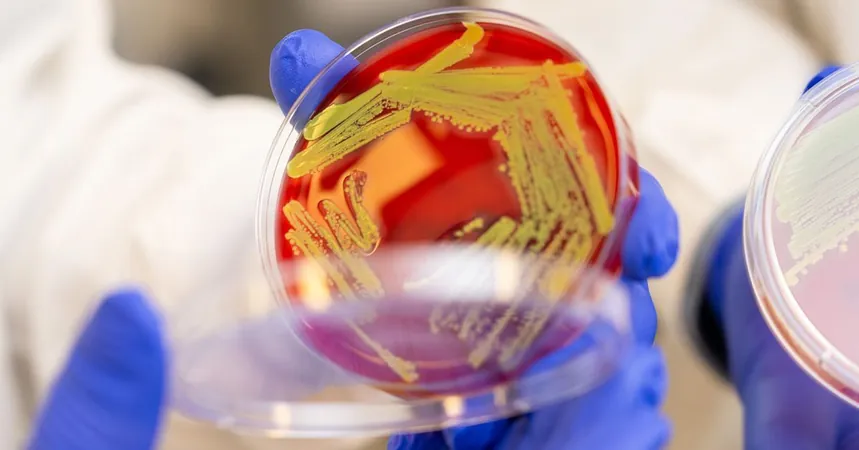
Groundbreaking ISS Study Reveals Brain Cells Mature Faster in Space!
2024-12-17
Author: Daniel
Groundbreaking ISS Study Reveals Brain Cells Mature Faster in Space!
An exciting new study from the International Space Station (ISS) has found that brain cells may mature more quickly in microgravity, raising intriguing questions about the neurological effects of space travel. While it is well-known that the lack of gravity can affect everything from muscles to bones and even the immune system, the specific impacts on the brain have been relatively unexplored.
Researchers from Scripps Research joined forces with the New York Stem Cell Foundation to investigate how brain cells respond in space. They sent tiny clusters of stem-cell-derived brain cells, known as “organoids,” to the ISS to observe how these cells behaved in a microgravity environment.
What they discovered was nothing short of astonishing: the organoids returned healthy after a month in orbit and exhibited signs of accelerated maturation. Compared to identical organoids grown under Earth’s gravity, those in space were closer to becoming adult neurons and showed early signs of specialization. These findings, published in the journal Stem Cells Translational Medicine, could significantly influence our understanding of space travel's potential neurological impacts.
Dr. Jeanne Loring, a senior author on the study and a professor emeritus at Scripps Research, expressed surprise that the cells not only survived in space but thrived, laying the groundwork for future experiments investigating how microgravity might influence other regions of the brain, particularly those affected by neurodegenerative diseases like Alzheimer’s, Parkinson’s, and multiple sclerosis.
The organoids were designed to mimic cortical and dopaminergic neurons—key players in brain function that are particularly impacted by diseases such as multiple sclerosis and Parkinson’s disease. Additionally, some organoids were created with microglia, the brain’s resident immune cells, to study the impact of microgravity on inflammation.
To circumvent the challenges of lab maintenance aboard the ISS, scientists developed a novel approach to grow smaller organoids in specialized cryovials, originally intended for deep freezing. These organoids were carefully prepared at the Kennedy Space Center and transported to the ISS in a miniature incubator.
Upon return to Earth, the researchers conducted detailed analyses of RNA expression patterns—indicative of gene activity—comparing the space-grown organoids to their Earth-bound counterparts. Surprisingly, organoids in microgravity exhibited higher expression levels of genes associated with maturity while displaying decreased proliferation, indicating that they were developing faster but replicating less than those cultured on Earth.
“We found that the organoids exposed to microgravity showed a gene expression profile typical of a more advanced stage of development compared to those on Earth,” Dr. Loring noted. “This doesn’t mean they’re adult neurons, so it’s crucial to clarify that we’re not identifying aging processes just yet.”
Interestingly, the investigators found less inflammation and fewer stress-related gene expressions in the space-grown organoids, contradicting their initial hypothesis that microgravity would increase stress levels. The underlying reasons for this unexpected finding remain to be explored.
Dr. Loring speculated that the unique conditions of microgravity may closely resemble the internal conditions of the brain. In microgravity, there’s a lack of convection—substances don’t move in the same way they do under Earth’s gravity—creating an environment where the organoids operate more independently, much like a miniature brainlet.
This investigation marks just the beginning of their journey; the research team has conducted several follow-up missions to the ISS, continuing to replicate their initial findings while adding new experimental conditions.
Looking ahead, Dr. Loring revealed, "Our next objective is to dive deeper into the brain areas that are most impacted by Alzheimer's disease. We’re also keen to explore how neurons interact in space. Each experiment we undertake on the ISS is pioneering territory, revealing new complexities to how microgravity impacts brain development and function."
As humanity prepares for longer space missions, breakthroughs like these will be crucial for understanding how our brains might adapt—or face challenges—during extended periods beyond Earth. Stay tuned as this groundbreaking research unfolds!


 Brasil (PT)
Brasil (PT)
 Canada (EN)
Canada (EN)
 Chile (ES)
Chile (ES)
 España (ES)
España (ES)
 France (FR)
France (FR)
 Hong Kong (EN)
Hong Kong (EN)
 Italia (IT)
Italia (IT)
 日本 (JA)
日本 (JA)
 Magyarország (HU)
Magyarország (HU)
 Norge (NO)
Norge (NO)
 Polska (PL)
Polska (PL)
 Schweiz (DE)
Schweiz (DE)
 Singapore (EN)
Singapore (EN)
 Sverige (SV)
Sverige (SV)
 Suomi (FI)
Suomi (FI)
 Türkiye (TR)
Türkiye (TR)